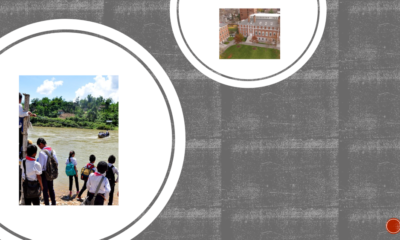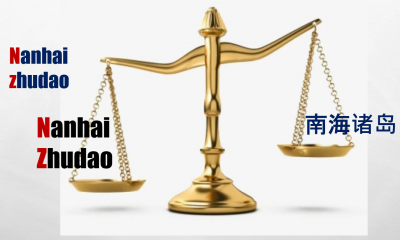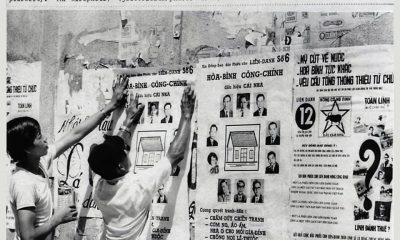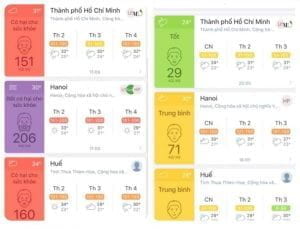The monopoly of power goes hand in hand with the monopoly of information. The logic seems convincing to most people. However, since the internet became a public good thirty years ago, many would say the government’s monopoly of information in authoritarian regimes is increasingly challenged. That may be true in many places, but what happened in Vietnam this week bucked the trend. In this case, the monopoly of power won flat.
In recent years, residents in Hanoi and Ho Chi Minh City metropolitan areas, the two major cities where a quarter of the country’s population live, have been experiencing the worst air pollution. Public outcry hit a peak last week when AirVisual, an environmental monitoring app that provides real-time air quality measurement, showed how toxic the air was in these cities.
AQI index on AirVisual was constantly either red (unhealthy) or purple (very unhealthy). Both Hanoi and Ho Chi Minh City topped the list in terms of bad air quality. At some point, PM2.5 exceeded the national standard by 11 times or 25 times that of WHO.
As the information accumulated, more people learned about the deadly consequences of toxic air. The no-new news went viral as people started to go online to post, comment, share, and especially to question how the Vietnamese government has responded to public demand.
The discussions led to all directions, including how the citizens of Indonesia sued their government for severe air pollution, or how Thailand’s government was trying to cope with the air disaster.
Three days ago, Prime Minister Nguyen Xuan Phuc ordered leaders of Hanoi and Ho Chi Minh City to solve the problem of air pollution. In the afternoon of the same day, the Vice Minister of Environment and Natural Resources spoke to the press that the Ministry had plans to install more monitor stations to better inform the public.
All out of a sudden, AirVisual, from being one of the top apps downloaded in Vietnam in the last few weeks, became unavailable for IPs addresses from Vietnam. For those who can manage to get an IP from another country (using a VPN or similar means), it is still downloadable. For those who already have the app on their phones, the result will still be updated. However, the result will include only data provided by the Vietnamese government, excluding the information generated from the monitor stations such as the US Embassy in Hanoi.
For all the good it did to inform Vietnamese people about what they were breathing in, AirVisual received tons of 1-star evaluations. Someone, actually many of them, tried to kill the app and its provider commercially.
The online community identified a key post that was believed to start the 1-star reports. The post read:
“I don’t know if the owners of Airvisual understand Vietnamese or not, but they must be so glad to witness the stupidity of Vietnamese people these days, [with] 1.3 million times download, about 10,000-page likes (some page got 13,000 likes). [A]nd facial masks are completely sold out. Our task now is to prove to them that “Vietnamese can be a bit silly but not obedient”. What you can do are:
- Report fan page, vote 1* for them to die
- Uninstall the app, report app
- Pressure them to apologize
Besides, all newspapers that published articles with the title “Hanoi was most polluted in the world” must be reported, and then demanded to apologize [to the public].
After the AirVisual app was blocked, the color indicating air quality in Hanoi and Ho Chi Minh turned yellow, sometimes green, telling its readers that air pollution in the two cities was less severe.
An app user in an exchange with AirVisual on their facebook fan page
Vietnam insists on the government’s monopoly over the information flow. In a talk in 2013, the head of the Communist Party’s Propaganda Department in Hanoi claimed that the city had created a force of about 900 online commentators to “be on the frontline in the fight against the lies from hostile forces [to the country].” Their number is believed to have increased sharply over the last few years, dedicated to monitoring, countering, and reporting netizens who write unfavorable things online about the party.

Air quality indicator on AirVisual before and after the app blocked
As of 2019, Vietnam has 859 print and 135 online newspapers and magazines, and 67 radio and television stations. All are placed under the strict control of the party’s Central Propaganda Department.
Recently, Vietnam consolidated its propaganda and censor machine targeting online community, as revealed by the establishment of the Cyber War Command (Bộ tư lệnh Tác chiến không gian mạng) under the Ministry of Public Security in 2017.
Facing better informed subjects, the Vietnamese government has strived to “improve” itself to become a more effective ruler, and the race on the cyberspace gets tougher.
Thuy Nguyen[/et_pb_text][/et_pb_column]
[/et_pb_row]
[/et_pb_section]

 Politics & Economy3 years ago
Politics & Economy3 years ago
 Society & Culture4 years ago
Society & Culture4 years ago
 ARCHIVES4 years ago
ARCHIVES4 years ago
 Politics & Economy3 years ago
Politics & Economy3 years ago
 Politics & Economy4 years ago
Politics & Economy4 years ago
 Politics & Economy3 years ago
Politics & Economy3 years ago
 Politics & Economy4 years ago
Politics & Economy4 years ago
 ARCHIVES3 years ago
ARCHIVES3 years ago








